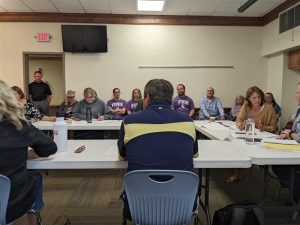Cody High School Library Retains Controversial Books
Written by Andrew-Rossi on June 2, 2022
After a brief but important hearing, the Park County School District #6’s Educational Resource Complaint Committee decided whether they should keep or remove two books available in the Cody High School library.
Nearly 50 people attended the first of two hearings regarding two books currently available in the Cody High School library. Park County School District #6’s Educational Resource Complaint Committee heard the cases to remove or retain the books The Color Purple and How to Be an Antiracist.
The R.E.C. Committee is not an extension of the school board but a mix of schoolteachers, administration, and parents. At any time, at least three members must be parents.
The complainants – Carol Armstrong for The Color Purple and Jim Vetter for How to Be an Antiracist – had ten minutes to make their case. District Librarian Jennisen Lucas also had ten minutes to state her case as district librarian. At the end of each argument, the committee was allowed to ask questions before calling for a vote.
The crowd was a mix of Cody residents of all ages. Intriguingly, many attendees wore the color purple – a clear sign of their support for the novel and the importance of keeping it available for Cody High School students.
Armstrong’s argued that The Color Purple is inappropriate for high school students due to its “pornographic content” and “vulgar language.”
Armstrong referenced her childhood during World War II, lamenting the “moral decline” in the nation ever since the war. Core values, she says, are continuously under attack.
She calls it a “vulgar, adult book” and considers it pornographic. These concepts, she says, should not be introduced to the impressionable minds of “children.”
The epistolary novel, The Color Purple, published in 1982 by Alice Walker, follows the story of Celie, a young, poor, and uneducated 14-year-old African American girl living in the Southern United States in the 1900s. In the book, her father, Alphonso, beats her and sexually abuses her. The rest of the novel traces the gradual triumph of Celie as she comes to resist cruelty and oppression.
Narrating her life through letters to God, Celie reveals painful truths about marriage, friendship, love, and abuse. Eventually developing relationships with other black women, Celie’s story explores one person’s journey to find fulfillment and independence. Walker’s novel won the Pulitzer Prize in 1983. In 1985, Steven Spielberg directed an acclaimed film adaptation of the book.
Armstrong cited the principles of the Founding Fathers and C.S. Lewis. She also noted the Supreme Court case Miller v. California, which ruled obscene material is not protected as free speech under the 1st Amendment.
In addition, Armstrong didn’t want the perception she was attempting to ban the book. The book is available at the Park County Library and for purchase in many places and doesn’t need to be available in a high school library.
During the Q&A, there was a discussion of the library’s notification email system. Parents automatically receive emails every time their children check out books from the school library. However, parents can opt out of the emails at any time.
Armstrong emphatically states, “parents are the boss” regarding education in public schools. The committee said the email system was another example of parental authority, as they can choose not to let their children read the book.
Lucas reviewed the book selection process and the determinations used to evaluate age-appropriateness, saying personal feelings are not the most important factor when deciding what literature should be available to students.
Lucas cited several independent agencies – like Common Sense Media – that have assigned appropriate ages to books like The Color Purple. In this case, parents think the book is more appropriate at an earlier age than students. Parents think it’s suitable for ages 13 up, students feel 16 and up is appropriate.
In addition, Lucas said the book is considered “classic literature” and is a piece of historical fiction relevant to school curricula. Books like Walker’s novel teach critical thinking and reading inside of a useful historical context – essential skills for all children.
Lucas did not deny the book contains physical and sexual abuse and vulgar language. However, the book also depicts segregation in the American South before the civil rights movement and depicts characters meeting and overcoming the serious challenges.
After a few comments and some discussion, the committee voted unanimously to keep The Color Purple in the Cody High School Library.
After the arguments and Q&A, the committee was allowed to make comments. The consensus was since The Color Purple is not part of the school’s English or Social Studies curriculum, it was optional reading and didn’t need to be removed.
One committee member mentioned that the First Amendment also protects someone’s exposure to ideas, and ignoring the book’s educational value is a “slippery, dangerous” slope when it comes to student rights. This comment drew scattered applause – the only disruption during the half-hour hearing.
After a call for a vote, the committee submitted their votes anonymously. The result was an 8-0 vote to keep The Color Purple in the Cody High School library.
The committee held a similar hearing for Ibram X. Kendi’s 2019 book How to Be an Antiracist, which remains in the Cody High School Library after a 9-0 vote.
*This story was written by Andrew Rossi and Caleb Nelson


